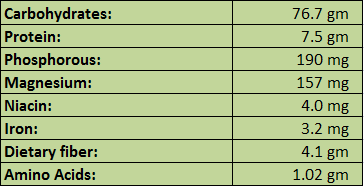Top 8 Health Benefits of Rice
Rice, a staple food item for the Indian subcontinent constitutes of largely carbohydrates, which essentially provides energy to pursue our everyday activities. However, that is not the sole health benefit of rice.Rice plays several crucial roles in our diets and this text simply emphasizes on a few aspects of the many health benefits of rice.
Other names of Rice –
- Oryza sativa (Botanical name)
- Arisi (Tamil)
Calories (energy) in Rice : 346 K.cal / 100 gm
Major Nutrients Present in Rice :

Health Benefits of Rice:
Following are the health benefits of rice.
- Rice is high in resistant starch that does not dissolve or is digested throughout the chemical changes of the habitat of the digestive system.
This starch therefore, helps in growth of useful bacteria in the rectum facilitating easy movement of the bowels and preventing disorders like diarrhea and IBS.
- The outer shell of rice, otherwise called bran is used to obtain rice bran oil. This rice bran oil being rich in omega 3 fatty acids, an essential fatty acid that the body cannot manufacture on its own is excellent for reducing cholesterol levels.
Other varieties of rice including red rice, wild rice and brown rice, are also endowed with the same health benefits.
- Vitamins like Vitamin D, niacin, fiber, thiamine, iron, riboflavin, etc enrich the micronutrient quality of rice. These components ensure that rice yields health benefits like, better immunity, healthy body metabolism, etc because vitamins are consumed in nearly in almost every body process.
- Rice Husk :
- The husk of rice is often used as a treatment for dysentery.
Being rich in dietary fiber, this helps provide body to the bowels and thus curb the frequent bowel movement. Other than that, another factor you must keep in mind is that it has to be obtained from three months old rice plant husks.
- Rice husk is an excellent diuretic.
Chinese culture believes that it can build an appetite, reduce stomach related illness and reinstate balance in the digestive system of the body harmonizing its working with the rest of the body.
- Rice husk and its fiber contents also help you to lose the excess water weight.
Along with the water, the body also eliminates a large number of toxins that have accumulated in the body in due course of time, thus aiding the process of detoxification.
- Rice husk, again, influences the bowel movements, which reduces the chances of occurrence of a large number of cancers by huge margins.
- Research suggests that some nutrients of rice have a positive impact on the activity and secretion of neurotransmitters in the brain. Essentially dealing with memory, these neurotransmitters reduces the chances of an individual from falling prey to all forms of dementia, including Alzheimer’s disease that is spreading like wildfire in the present generation.
- Powdered rice soothes the skin and helps alleviate inflammation, thereby sealing its spot as one of the many solutions our skin ailments ranging from zits and redness or itching.
- The insoluble fiber in rice also ensures that the colon and inter-rectal regions are clean. This inhibits the growth of harmful bacteria that lead to putrefaction of the remnants in the colon and thus reduce the chances of occurrence of ulcers and intestinal cancers.
- Being low on sodium, rice tops the chart of food items a high blood pressure patient can consume. The low sodium content ensures that the veins and arteries do not constrict leading to increase in blood flow and make the load of blood easy for the heart and the brain to handle.
Clearly, rice, irrespective of the species consumed and the form you consume it in, is excellent for your mental and physical health. At least, these health benefits of rice that we have obtained from various scientific sources suggest so.
Points of Caution:
- Rice has high glycemic index, which can cause blood glucose levels to shoot up.
- It may increase the risk of type II diabetes mellitus.
Image Credit: Wikimedia
REFERENCES:
Major Nutrients Present- Nutritive Value of Indian Foods from National Institute of Nutrition.
